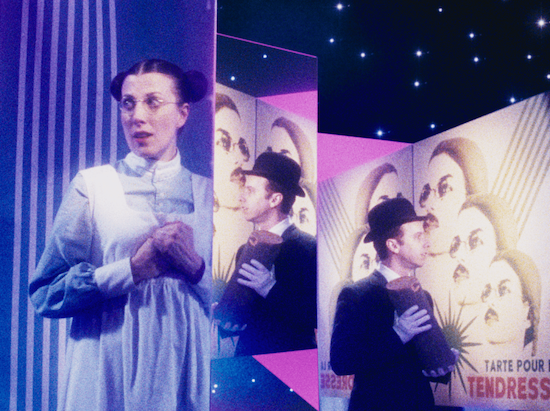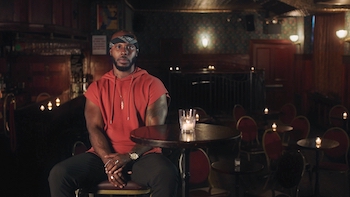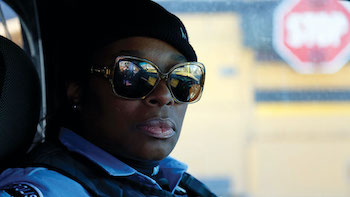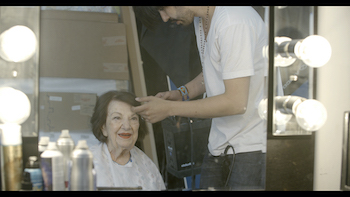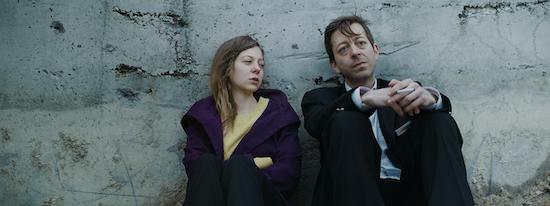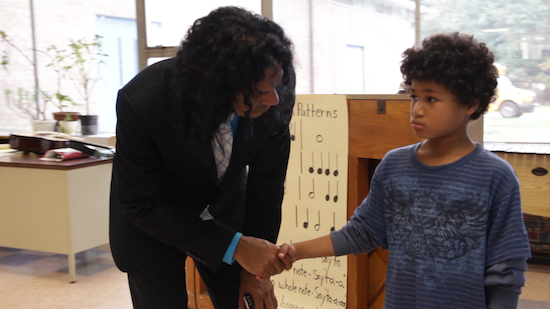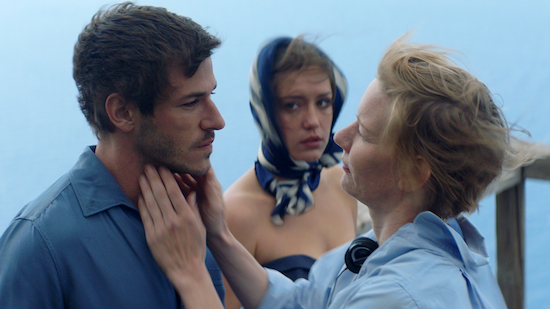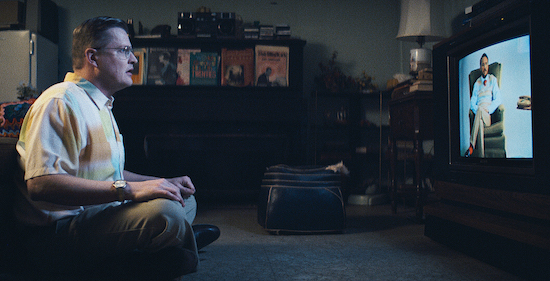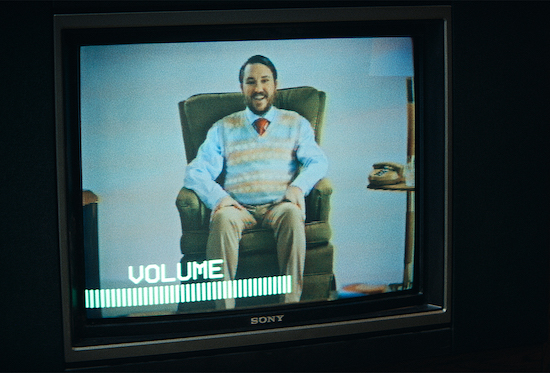- 4 years ago
-
Oscilloscope Laboratories It’s a common belief that people look for fantasy entertainment during stressful, depressing times, but Matthew Rankin’s deeply surreal film The Twentieth Century would probably be satisfying to watch at any time. Well, satisfying to anyone who can appreciate an absurd, hilarious, heavily stylized “bio-pic” based on the century-year-old diaries of a Canadian prime minister.
As most Americans probably don’t know, William Lyon McKenzie King served as Canada’s PM for three non-consecutive terms in the 1920s and 30s, and is known for being a solid, if dull, statesman. For his audacious debut feature, Rankin created a film very loosely based on King’s private journal musings. Many critics have compared the result to the dark, fantastical work of fellow Winnipeg native Guy Maddin and to Monty Python, which makes sense. I’d add that The Twentieth Century is a little like a visually stunning episode of Drunk History, if the narrators dropped acid instead of drinking alcohol and Wes Anderson (also on acid) were the cinematographer. It’s full of references to historical Canadian figures and events, which invite multiple visits to Wikipedia. Or not, if viewers just want to let the film wash over them in hallucinatory waves. It obvious to anyone, though, that Rankin repeatedly pokes at Canadian traits and identity throughout the film, often its funniest bits.
Oscilloscope Laboratories The action begins in Toronto in 1899, as young candidate King (Dan Beirne, all in with this role) campaigns at the Hospital for Defective Children. (King didn’t actually run for PM until 1921, but that’s the least of the film’s liberties.) His father (Richard Jutras), in debt because he has financed his son’s campaign, has been abandoned by his wife, King’s ailing, overbearing mother (Louis Negin, in one of the film’s several cross-gender roles). The young man falls for the beautiful, unattainable woman of his mother’s (literal) dreams, though it’s the latter’s long-suffering nurse (Sarianne Cormier) who is clearly smitten with him.
A persnickety, upstanding sort — except for a shameful fetish – King is clearly a man under pressure.
Under the supervision of a John Cleese-like Justice Anderson (Trevor Anderson), King takes part in Tests of Leadership, along with the other candidates. They compete in ribbon-cutting, leg-wrestling, (the wonderfully Canadian) waiting your turn, tree identification and baby seal clubbing, among other skills. The last event gets pretty bloody, as do a few other scenes, contributing to The Twentieth Century’s dark tinge.
Oscilloscope Laboratories The film is divided into chapters, as King travels to different cities including Vancouver, where a sadistic doctor subjects him to A Clockwork Orange-type conditioning to overcome his fetish. He’s also fitted with an apparatus that sounds an alarm when it “detects the slightest disturbance in his loins.” (Needless to say, this will result in humiliation.) There’s also a tense situation in Quebec to contend with, along with the Boer War and the country’s split between its supporters and detractors. None of this stops King from pursuing his ambition to steer Canada through the upheavals of the new century.
Naughty jokes and homoerotic references are sprinkled throughout the film, along with many mentions of maple-walnut ice cream. Stark animation, minimalistic sets and portentous signs give the film its specific look, reminiscent of German Expressionism and Russian propaganda films. The result is a unique, whimsical take on a historical figure and Canadian culture that’s ultimately all just a sh*t tonne of fun.
The Twentieth Century is available on streaming platforms on Friday, December 11.
—Marina Zogbi
Latest News
- 4 years ago
-
This may be the craziest, most emotionally disruptive fall in recent history, but the annual DOC NYC film festival is right on schedule. Like many other events these days, the country’s largest all-documentary fest, now in its 11th year, is completely virtual, making it available nationwide for the first time. Running online from November 11 through 19, and accessible to viewers across the U.S., this year’s edition includes 107 feature-length documentaries among over 200 films and dozens of events. There’s an emphasis on diversity with 57 features (53% of the lineup) directed or co-directed by women and 36 by Black, indigenous and people of color (34% of the feature program).
As always, there’s a lot of docs to choose from, many of which are world or U.S. premieres. Aside from the films themselves, there will be conversations with filmmakers taking place daily in “DOC NYC Live” events, and pre-recorded filmmaker Q&As after film screenings.
Among the festival’s many worthy entries:
Duty Free, directed by Sian-Pierre Regis (making his feature debut), a film about Rebecca Danigelis, Regis’s 70-something mother, who is fired from her hotel housekeeping job. When she is unable to land another position, her son raises money through Kickstarter to fund Rebecca’s bucket list, which includes desires both humble (milk a cow) and expansive (a visit to England to her sister’s grave and reunite with the daughter she gave up). Many themes are woven throughout, including ageism and racism (Regis is biracial); the film ultimately raises awareness of the caregiving crisis in this country, especially for older people with little money.
No Ordinary Man, co-directed by Aisling Chin-Yee and Chase Joynt, documents the life of jazz musician and bandleader Billy Tipton. Born Dorothy Lucille Tipton in 1914, the film’s subject identified as male early in life and maintained that identity until his death in 1989, when his birth sex was discovered (and made headlines). His story is told through various transgender figures (who also talk about their own experiences), as well as Tipton’s son. The film becomes a poignant exploration of trans masculinity as well as a tribute to a beloved pioneer in the trans community.
Women in Blue, directed by Deirdre Fishel, is an exceptionally timely film about the efforts of women in the Minneapolis Police Department to transform the agency’s male culture. Mostly filmed before the murder of George Floyd by an MPD officer, the doc offers a rare perspective into the troubled department’s previous attempts at reform (under Chief Janee Harteau, who was forced to resign after a high-profile police shooting) and the frustrations of several hard-working female cops, including one African-American officer who must battle several types of prejudice in the department and in her community.
Crutch, co-directed by Sachi Cunningham and Vayabobo (Chandler Evans), is the story of performance artist and hip hop dancer/choreographer Bill Shannon, whose disability became the source of his unique art and athleticism. Diagnosed with a degenerative joint disease at a young age, Shannon broke into the 1990s breakdancing scene using his crutches to create distinctive, acrobatic moves. The film periodically shows present-day Shannon teaching movement and more at a camp for kids with his condition (Legg-Calvé-Perthes), serving as a source of inspiration for them and for us.
Calendar Girl, directed by Christian Bruun, is about a well-known and beloved figure to anyone who’s worked in the New York fashion world during the past 70 years. That’s Ruth Finley, indefatigable founder and editor of the Fashion Calendar, an industry bible of fashion week schedules and other listings she began publishing in the 1940s. Dozens of designers and fashion figures discuss Finley’s influence on their careers throughout the decades; we also see the inevitable transfer of the Calendar’s ownership as Ruth approaches her mid-90s. Throughout, she remains amazingly upbeat and energetic.
Other feature highlights include Ashley O’Shay and Morgan Elise Johnson’s Unapologetic, which chronicles the tireless work of two Black female activists in Chicago; Raquel Cepeda’s La Madrina: The
SavageLife of Lorine Padilla, about the beloved South Bronx matriarch and former “First Lady” of the Savage Skulls gang; and Imelda O’Reilly’s Tumbling Towards Home, which follows Irish actor Malcolm Adams as he navigates New York City, his career and his life.Just a few of many short film highlights: Betye Saar: Taking Care of Business; Butts, a whimsical look at (yep) butts, from China; Changing the Narrative: The Vision of Oscar Micheaux; and Pam, about a 73-year-old retired NYC school teacher preparing for her dance recital.
Click here for DOC NYC 2020’s full line-up and ticket info.
—Marina Zogbi
- 5 years ago
-
Dark Star Pictures Orçun Behram’s feature debut The Antenna will probably be most meaningful for those living in Turkey, the Istanbul-based filmmaker’s birthplace. His stylish horror movie portrays a dystopian world in which a broadcasting system installed in apartment complexes turns out to be a monstrous presence, a clear (sometimes too clear) metaphor for life under the current regime. Beautifully shot in sickly, muted tones, the action takes place in a bleak-looking neighborhood of drab high-rises and is experienced mainly through the eyes of the soulful put-upon building attendant Mehmed (Ihsan Önal).
We first learn about the new government initiative through cheerful news bulletins, followed by the arrival of a technician who sets up a satellite dish on the roof of Mehmet’s building. When the guy abruptly meets a bad end, Mehmet’s supervisor Cihan (Levent Ünsal), a classic mid-level bureaucrat, is suspiciously nonchalant about the whole business.
Things around the apartment complex soon become very weird and threatening, as an oozing black liquid begins seeping into every apartment and scene. We see how three different tenants (a single woman, a couple with a young son, and the family of Mehmet’s friend Yasemin) fare as something inexplicable takes over.
Dark Star Pictures The Antenna starts out quietly, but its soundtrack gradually becomes ominous and intrusive, featuring the magnification of seemingly benign sounds. Visually, there are a variety of familiar references–overhead shots, close-ups, strange and grotesque angles, many reminiscent of the surreal work of David Cronenberg or Terry Gilliam (Brazil) The Big Brother theme is also very evocative and there is some obvious symbolism (bird in cage) which makes the film less than gripping, despite its grimly effective vibe.
The film is a slow creep, eventually surging beyond dystopia into full-blown hell. Though the many elements that obviously inspired Behram are a bit of a drawback, there’s enough here to suggest a promising future for Behram.
Sweet 180 The subject of Lillian LaSalle’s documentary My Name is Pedro is one of the most unsung of leaders, a public school administrator. Pedro Santana is an especially worthy example of that group: a former special ed kid from an impoverished family who wound up devoting his life to the education of children from similar backgrounds. He’s also a warm personality and charismatic visual figure whose long hair often drew comparisons to Michael Jackson (not a bad thing at one time).
LaSalle documented Santana’s life over the course of seven years for her debut feature (she previously served as producer on several other films), so it’s understandable that the result is at times a bit rambling. A lot took place, especially during Santana’s time as assistant superintendent of the East Ramapo Central School District in Rockland County, N.Y., where he was brought in to help smooth over tensions between the parents of public school children and members of the local school board representing the area’s Orthodox Jewish community.
Santana’s ascent to that role is remarkable—from struggling Bronx student to Peace Corps volunteer (unusual for someone from his background) to public school teacher (after getting himself into Columbia’s Teachers College) to assistant principal, then principal—Santana owes his success to one particularly supportive grade-school teacher. An inspiration to both parents and students, many of whom are interviewed for the film, he himself changed the lives of several students by connecting with them individually. After improving the grades of several Bronx schools, Santana was courted by the East Ramapo school district, a similarly challenged area.
Sweet 180 Despite difficult obstacles—both public (including a struggle for power within the school board) and tragically personal—Santana perseveres.
Though completed in 2017, the documentary feels particularly inspiring during these turbulent times. It’s a reminder of just how much of a difference a good educator can make in the life of a young person or a school. This might sound all very obvious, but when we watch someone like Santana in action, we both moved by his compassion and commitment, and saddened by the fact that a he’s a rarity.
The Antenna and My Name is Pedro open in virtual cinemas on Friday, October 2.
—Marina Zogbi
- 5 years ago
-
There will undoubtedly be many movies coming out in the near future about life during the pandemic, but I’m not sure any of them will top the beautiful, resonant short Sincerely, Erik, by filmmaker Naz Riahi. This charming work about a bookseller navigating isolation in NYC during Covid-19 (played by actual bookseller Erik DuRon) was shot on location in June. Check it out: https://vimeo.com/434705621
Now that we’ve hopefully weathered the worst of it (at least in New York) and we’re feeling somewhat less traumatized by the pandemic — if not by other current events — it might feel OK to watch dark films again?
Sibyl, courtesy of Music Box Films Two new movies that fit that description, albeit in very different ways, are Justine Triet’s mostly French-language psychodrama Sibyl and Jon Stevenson’s horror-thriller Rent-a-Pal, out on Friday. Both films are darkly comic and they both build to pretty extreme endings, but the similarities end there.
Sibyl is Triet’s third feature, all of which center on complicated women trying to keep it together amid tricky relationships and difficult situations. As in 2016’s In Bed with Victoria, the protagonist is played by the luminous Virginie Efira as the title character. Sibyl is a psychotherapist who is leaving the profession to write a novel — until she is pulled back in by a young woman desperate for her help.
That is Margot (a beguiling Adèle Exarchopoulos), an actress who is anxious about shooting her first major film, which happens to co-star her married lover Igor (Gaspard Ulliel).
Sibyl, courtesy of Music Box Films There’s a lot going on around this core plot line, as well as in Sibyl’s life and head, including her needy sister Edith (Laure Calamy, so memorable in the series Call My Agent) and the lurking legacy of their deceased mother; Sibyl’s husband and their two young daughters; and her ex-boyfriend Gabriel (Niels Schneider), about whom she can’t stop thinking and fantasizing. In conveying all this, Sibyl is full of short, impressionistic scenes and flashbacks, which can sometimes feel disjointed.
When the increasingly dependent Margot begs Sibyl to come visit her film set in Italy, things really get complicated. This film within a film is directed by Igor’s practical wife Mika (the funniest character in the film, played by the fabulous Sandra Hüller), who is hell-bent on keeping the production going, as her actors (including her husband) argue and misbehave. Somehow, Sibyl — whose own psychic cracks are beginning to show — becomes the person everyone confides in and relies on.
Sibyl is funny and flamboyant, but it’s also about loss, sadness and self-worth. Triet stuffs a lot into her movie, and while the result is messy, it’s also fascinating and highly watchable (thanks in large part to its excellent cast).
Rent-A-Pal, courtesy of IFC Films The first feature from writer/director Jon Stevenson, Rent-A-Pal is based on a video he found of an old VHS tape called “Rent-A-Friend,” featuring a strange, friendly guy offering advice and companionship to lonely people. That’s a good premise for either a comedy or horror movie; the spare, disquieting Rent-A-Pal falls mainly into the latter category.
The film takes place in 1990, but the garish visuals, music and technology scream ’80s. Forty-year-old David (Brian Landis Folkins) is a classic solitary, sensitive type — serving as caretaker for his dementia-riddled mother (Kathleen Brady), while living in her basement. He spends a lot of time and money on Video Rendezvous, a video-profile dating service, but is not having any luck getting matched.
One day, he finds an intriguing videotape starring the super-amiable Andy (Wil Wheaton), a guy who seems to understand poor souls like David, and who offers advice and support. He asks questions and comments on David’s answers, with the ensuing “dialogue” sometimes eerily synching up. As David’s life become more depressing, he is drawn to repeated viewings of “Rent-A-Pal.”
Rent-A-Pal, courtesy of IFC Films Meanwhile, Video Rendezvous has come up with a match for David and it’s a good one. Lisa (Amy Rutledge) is a fellow sensitive soul and caretaker who seems to get him.
You don’t have to be a horror movie buff to know that mysterious, intriguing videotapes have bad consequences. Rent-A-Pal Andy doesn’t go away despite David’s new relationship, as Wil Wheaton’s beaming smile and bonhomie morphs into something else (this must have been a fun role for him). The fairly slow-paced film becomes increasingly manic, going full-out horror by the end. Creepy. claustrophobic and comic, Rent-A-Pal isn’t completely believable, but it’s suspenseful and fun, not least because of the ‘80s references.
Sibyl opens at Film at Lincoln Center on Friday, Sept. 11; Rent-A-Pal opens the same day On Demand and in select theaters.
— Marina Zogbi
- 5 years ago
-
Event performance celebrating the end of the summer program (2019). Now in its third year, Art for Progress’ summer program gives students the opportunity to learn about life as a professional artist, while also learning new advanced skills to help them achieve their goals.
Funded by the Pierre and Tana Matisse Foundation with additional support from the Sansom Foundation, the program is taught by professional teaching artists with a long history of working with Art for Progress (AFP) in NYC’s Public Schools and other important projects. Thanks to the generous support of our sponsors, the program will be funded through 2021, which gives AFP the opportunity to expand and grow the program even more.
Over the years, the program has invited Grammy nominated musicians, prominent visual artists and high-level fashion designers as its guest speakers. It has been a valuable and exciting part of the program for students and highly rewarding for the artists. There’s no cost for students to attend.
Though the program for this summer will be hosted online, it will be one of the best yet, due in large part to Art for Progress’ newly developed online learning platform: https://learn.artforprogress.org, which was created to optimize the experience for both our teachers and students. The new website includes many valuable features which will enhance learning and promote better communication. This summer’s program is planned over four weekends beginning July 25th and ending August 16th.
The program kicks off with “Skills and Insights for Today’s Musician” with special guest speaker, multi-instrumentalist, composer Ze’ Luis Oliveira. The following week the focus is shifted toward visual art with “Visual Art and Today’s Narrative,” and our special guest artist, illustrator Afua Richardson. The third weekend, “Advanced Skills in Music Production” will focus on helping young creators and producers hone their skills in the studio. Our guest Emilio China AKA Zef Noise will share his insights and experience as a musician, composer and improvisor. The final weekend is “Student’s Choice” where students have the opportunity to suggest the program for the last weekend. It’s open ended and could consist of any genre including performance and fashion design. Our special guest artist is inter-disciplinary artist Belaxis Buil [who’s based in Miami, Florida.
Some of the goals for the program include:
- To gain specific skills to help students progress and develop toward producing and marketing professional level work
- To gain insights into the real experiences of artists not often available in traditional learning environments
- To learn about the many paths an artist can take and to define their own path
This year the program will include the opportunity for students to earn awards for both attendance and participation. Awards will include music gear, private lessons and gift certificates for supplies. The details will soon be announced.
Applications are now open. Please visit https://learn.artforprogress.org and apply today.
In these challenging times, everyone at Art for Progress is proud and excited to have this opportunity to provide this enriching program.
To learn more about Art for Progress, visit www.artforprogress.org.


